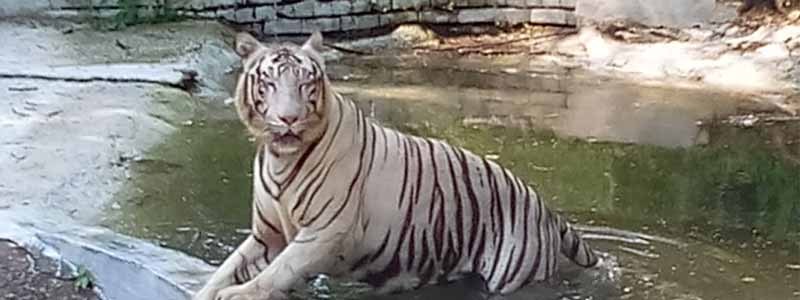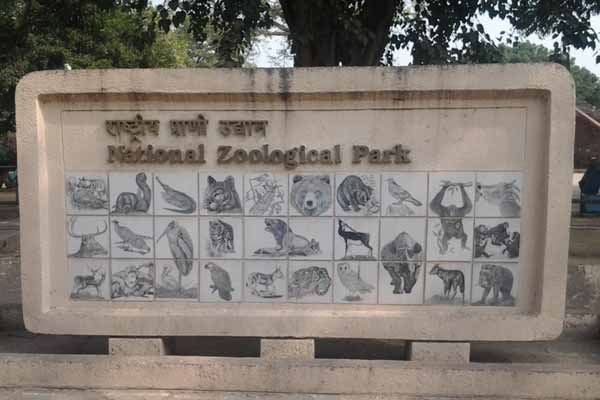National Zoological Park Delhi, also known as the Delhi Zoo, is situated near the Old Fort. It is home to over 1,000 animals, as well as a diverse range of flora and birds, and spans a 176-acre area.
Visit the hippopotamus as it takes a leisurely dip in the water, and watch the chimps tussle with each other, At the Delhi Zoo, you can figuratively wrap your head around the spider monkey’s extremely long arms and tails, or hear an Asiatic lion roar its authority as it prowls restlessly in its enclosure. National Zoological Park Delhi Other must-see stops include the royal Bengal tiger’s habitat, swamp deer’s habitat, Indian rhinoceros’ habitat, and brow antlered deer’s habitat, among others Visiting migratory birds such as storks and peafowl provide a fascinating sight for birdwatchers.
Tourists will visit the Reptile House, which houses a variety of lizards and snakes for an exciting experience.
The zoo first opened its doors in 1959. It also runs conservation breeding programmes for animals such as the royal Bengal tiger and the Asiatic lion, swamp deer, Indian rhino etc. The best way to explore the zoo is by hiring a battery-car that takes you to all the enclosures.
The zoo also has a library, which houses a collection of books on wildlife and provides information on the history of the zoo. Visitors are not allowed to bring any kind of food other than drinking water to the premises, National Zoological Park Delhi.

History of National Zoological Park
The main goal of creating a zoo in the nation’s capital was to provide residents and visitors with a safe and affordable break. In 1951, the National Board for Wildlife (formerly the Indian Board of Wildlife) made a special appeal to construct a zoo in National Zoological Park Delhi. To this end, a special committee was created, with E.F. as secretary. Bowring Walsh, who at that time was the secretary of the Society for the Prevention of Cruelty of Animals.
The proposal for constructing a zoo was now on track, with funding from the Central Government and the project being carried out by the State Government. In March 1956, a report on the layout plan was submitted to the Government of India, and by December 1956, the government had given its approval to begin work on the plan. By 1959, the zoo’s construction was complete, including roads, waterways, ponds, fences and animal houses been constructed alongside some lawns and plantation did.
With the news of the development of a zoo in Delhi spreading across the country, many zoos from different cities of India gifted many animals to the zoo authorities. The zoo was formally inaugurated on 1st November 1959 and was initially called as Delhi Zoo. In 1982, the name of the zoo was later changed to National Zoological Park from Delhi Zoo.
National Zoological Park, Delhi Timings and Entry Fee
The National Zoological Park is generally open for visitors from 9:00 am to 4:30 pm in summers and 0:30 am to 4:00 pm in winters, i.e. 1st April to 15th October and 16th October to 31st March, respectively.
National Zoological Park Delhi Ticket Price
Indians
- Adults – Rs. 80 /head
- Children of 5 – 12 years and senior citizens over 60 years – Rs. 40 /head
- No entry fee for children below the age of 5 years
Foreign Nationals
- Adults – (Other countries) Rs. 400 /head; (SAARC countries) Rs. 200 /head
- Children of 5 – 12 years – (Other countries) Rs. 200 /head; (SAARC countries) Rs. 100 /head
- No entry fee for children below the age of 5 years
Places to Visit Near National Zoological Park
1. Purana Qila or Quila
Purana Qila (formerly called as Shergarh & Sher Fort) is one of the oldest forts in Delhi and India which has been inhabited for nearly 2500 years. The fort is regarded as the site of Indraprastha which was the capital of the Pandavas from the Mahabharata period. The fort is around 6 km from the National Zoological Park Delhi and can be easily accessible by road.
Due to its historical importance and mammoth size and beauty, the fort is very popular among the tourists. There are various gates and mosques inside the Purana Qila like the Qila-i-Kuhna Mosque, Sher Mandal, Humayun Gate, Talaqi Darwaza, and many other gates.
2. Humayun’s Tomb
Humayun’s Tomb is the tomb of the second Mughal Emperor Humayun and is a UNESCO Heritage Site. Humayun’s tomb comprises of many other tombs of several other Mughal Emperors and other family members of the Mughal family. Also, the place is very popular for its popular and one of a kind Charbagh, the Persian Style gardens.The tomb is styled in the Mughal style architecture, similar to many monuments like the Taj Mahal, Bibi-ka-Maqbara, etc.
3. Rajpath
Rajpath is one of the most important roads of India which houses many ministries of the Indian Government. The road runs from the Rashtrapati Bhavan and ends at the India gate. Rajpath is the place where the annual Republic Day parade takes place. During the Britishers Rule, Rajpath was named as the “King’s Way” when the capital of India was moved from Kolkata to Delhi.
On one end of Rajpath lies the world-famous India Gate which stands as a memorial of the unknown soldier for the martyrs of World War I. Many national as well as international tourists visit India Gate in large numbers.
A few other places to visit near the National Zoological Park Delhi are the National Science Centre, Old Delhi Bazaar and the Crafts Museum, National Zoological Park Delhi.
How to Reach National Zoological Park
By Metro: Khan Market is the nearest metro station to the National Zoological Park. Take the metro from IGI International Airport metro station to New Delhi-Airport Express and then take another metro to Central Secretariat and then take another metro to Khan Market.
By Road: You can take DTC buses that run from Airport to National Zoological Park. Also, you can take private cabs which will be a little heavy on your pocket.
